- Home
- Philip Roth
The Prague Orgy Page 6
The Prague Orgy Read online
Page 6
Maybe.
Where are the stories?
I don’t know where.
He left them with you—you must know. His mother came to you and tried to get them, and you showed her photographs of his mistresses. That’s what he told me.
Don’t be sentimental. They were pictures of their cunts. Do you think they were so different from mine? You think theirs were prettier? Here. (Opens her robe) Look. Theirs were exactly the same.
You have all your things here?
I don’t have things. In the sense that you Americans have things, I don’t have anything.
Do you have the stories here?
Let’s go to the American Embassy and get married.
And then you’ll give me the stories.
More than likely. Tell me, what are you getting out of this?
A headache. A terrific headache and a look at your cunt. That’s about it.
Ah, you are doing it for idealistic reasons. You do it for literature. For altruism. You are a great American, a great humanitarian, and a great Jew.
I’ll give you ten thousand dollars.
Ten thousand dollars? I could use ten thousand dollars. But there’s no amount of money you could give me. Nothing would be worth it.
And you don’t care about literature.
I care about literature. I love literature. But not as much as I love to keep these things from him. And from her. You really think I am going to give you these stories so he can keep her in jewels? You really think that in New York he’s going to publish these stories under his father’s name?
Why shouldn’t he?
Why should he—what’s in it for html He’ll publish them under his own name. His beloved father is dead now ten times over. He’ll publish the stories under his own name and become famous in America like all you Jews.
I didn’t know you were an anti-Semite.
Only because of Sisovsky. If you would marry me, I would change. Am I so unattractive to you that you don’t want to marry me? Is his aging ingenue more attractive to you than I am?
I can’t really believe you mean all this. You’re an impressive character. Olga. In your own way you’re fighting to live.
Then marry me. if I am so impressive from fighting to live. You’re not married to anyone else. What are you afraid of— that I’ll take your millions?
Look, you want a ticket out of Czechoslovakia?
Maybe I want you.
What if I get someone to marry you. He’ll come here, get you to America, and when you divorce him I’ll give you ten thousand dollars.
Am I so revolting that I can only marry one of your queer friends?
Olga, how do I wrest these stories from you? Just tell me.
Zuckerman. if you were such an idealist about literature as you want me to be. if you would make great sacrifices for literature as you expect me to make, we would have been married twenty minutes already.
Is whatever Sisovsky did so awful that his dead father must suffer too?
When the stories are published in New York without the father’s name, the father will suffer more, believe me.
Suppose that doesn’t happen. Suppose I make that impossible.
You will outtrick Zdenek?
I’ll contact The New York Times. Before seeing Zdenek, I’ll tell them the whole story of these stories. They’ll run an article about them. Suppose I do that as soon as I’m back.
So that’s what you get out of it! That’s your idealism! The marvelous Zuckerman brings from behind the Iron Curtain two hundred unpublished Yiddish stories written by a victim of a Nazi bullet. You will be a hero to the Jews and to literature and to all of the Free World. On top of all your millions of dollars and millions of girls, you will win the American Prize for Idealism about Literature. And what will happen to me? I will go to prison for smuggling a manuscript to the West.
They won’t know the stories came through you.
But they know already that I have them. They know everything I have. They have a list of everything that everybody has. You get the idealism prize, he gets the royalties, she gets the jewelry, and I get seven years. For the sake of literature.
Here she gels up from the bed. goes to the dresser, and removes from the top drawer a deep box for chocolates. I untie the ribbon on the box. Inside, hundreds of pages of unusually thick paper, rather like the heavy waxed paper that oily foodstuff’s used to be wrapped in at the grocery. The ink is black, the margins perfect. the Yiddish script is sharp and neat. None of the stories seems longer than five or six pages. I can’t read them.
[Back in bed) You don’t have to give me money. You don’t have to find me a queer to be my husband. [Beginning to cry) You don’t even have to fuck me, if I am such an unattractive woman. To be fucked is the only freedom left in this country. To fuck and to be fucked is all we have left that they cannot stop, but you do not have to fuck me, if I am such an unattractive woman compared to the American girls. He can even print the stories in his own name, your friend Sisovsky. The hell with it. The hell with everything. In spite of the charm with which he seduced you, with which he seduces everybody, he can be quite vicious—do you know.’ There is great brutality in your Sisovsky. Did he tell you about all his doubts—his tragic doubts? What shit! Before Zdenek left Prague, we measured personal vanity here in millisisovskys. Zdenek will survive in America. He is human in the worst sense of the word. Zdenek will flourish, ihanks to his dead father. So will she. And in return, I want nothing. Only that when he asks you how much did you have to give her, how much money and how many fucks, you will do me one favor: tell him you had to give me nothing. Tell her.
At the hotel, two plainclothes policemen come to the room and confiscate the candy box full of Yiddish manuscript within fifteen minutes of my return. They are accompanied by the hotel clerk who’d earlier in the day handed me Hrobek’s note. “They wish to examine your belongings, sir,” he tells me—”they say somebody has mislaid something which you may have picked up by mistake.” “My belongings are none of their business.” “I’m afraid you are wrong. That is precisely their business.” As the police begin their search I ask him, “And you, what’s your business?” “I merely work at the reception desk. It is not only the intellectual who may be sent down to the mines if he does not cooperate with the present regime, the hotel clerk can be demoted as well. As one of our famous dissidents has said, a man who speaks only the truth, ‘There is always a lower rung under the feet of every citizen on the ladder of the state.’” I demand to be allowed to telephone the American Embassy, and not so as to arrange a wedding. I am told instead to pack my bags. I will be driven to the airport and put on the next plane out of Prague. I am no longer welcome as a visitor in Czechoslovakia. “I want to speak to the American ambassador. They cannot confiscate my belongings. There are no grounds on which to expel me from this country.” “Sir, though it may appear to you that ardent supporters of this regime are few and far between, there are also those, like these two gentlemen, who have no trouble believing that what they do is right, correct, and necessary. Brutally necessary. I am afraid that any further delay is going to cause them to be less lenient than you would like.” “What the box contains is simply manuscript—stories written by somebody who’s been dead now thirty years, fiction about a world that no longer even exists, It is no possible threat to anyone.” “I am grateful, sir, in times like these, still to be able to support my family. There is nothing a clerk in a Prague hotel can do for any writer, living or dead.” When I demand for the third time to speak to the Embassy, I am told that if I do not immediately pack my bags and prepare to leave, I will be arrested and taken to jail. “How do I know,” I ask, “that they won’t take me to jail anyway?” “I suppose,” the clerk replies, “that you will have to trust them.”
Either Olga had a change of heart and called the cops, or else they called on her. Klenek’s is bugged, everyone says so. I just cannot believe that she and the hotel clerk work for the same boss, but mayb
e that’s because I am a shallow, sentimental, American idiot Jew.
At the desk the police wait while I charge my bills to the Diners Club and then I am accompanied by them to a black limousine. One policeman sits up front with the driver and the candy box, and the other in the back with me and a bulky, bespectacled, elderly man who introduces himself gruffly as Novak. Soft, fine white hair like the fluff of a dry dandelion. Otherwise a man made of meat. He is no charmer like the hotel clerk.
Out beyond the heavy city traffic I am unable to tell if we really are on the airport road. Can they be taking me to jail in a limo? I always seem to end up in these large black cars. The dashboard says this one is a Tatra 603.
“Sie sprechen Deuisch, nicht wahr?” Novak asks me.
“Etwas.”
“Kennen sie Fraulein Betty MacDonald?”
We continue in Gennan. “I don’t,” I say.
“You don’t?”
“No.”
“You don’t know Miss Betty MacDonald?”
I can’t stop thinking how badly this can still turn out—or, alternatively, that I could honorably have abandoned the mission once I saw the dangers were real. Because Sisovsky claimed to be my counterpart from the world that my own fortunate family had eluded didn’t mean I had to prove him right by rushing in to change places. I assume his fate and he assumes mine—wasn’t that sort of his idea from the start? When I came to New York I said to Eva, “I am a relative of this great man.”
Guilty of conspiring against the Czech people with somebody named Betty MacDonald. Thus i conclude my penance.
“Sorry,” I say, “1 don’t know her.”
“But,” says Novak, “she is the author of The Egg and I.”
“Ah. Yes. About a farm—wasn’t it? I haven’t read it since I was a schoolboy.”
Novak is incredulous. “But it is a masterpiece.”
“Well, I can’t say it’s considered a masterpiece in America. I’d be surprised if in American anybody under thirty has even heard of The Egg and I.”
“I cannot believe this.”
“It’s true. It was popular in the forties, a bestseller, a movie, but books like that come and go. Surely you have the same thing here.”
“Trial is a tragedy. And what has happened to Miss Betty MacDonald?”
“I have no idea.”
“Why does something like this happen in America to a writer like Miss MacDonald?”
“I don’t think even Miss MacDonald expected her book to endure forever.”
“You have not answered me. You avoid the question. Why does this happen in America?”
“I don’t know.”
I search in vain for signs to the airport.
Novak is suddenly angry. “There is no paranoia here about writers.”
“I didn’t say there was.”
“I am a writer. I am a successful writer. Nobody is paranoid about me. Ours is the most literate country in Europe. Our people love books. I have in the Writers” Union dozens of writers, poets, novelists, playwrights, and no one is paranoid about them. No, it isn’t writers who fall under our suspicion in Czechoslovakia. In this small country the writers have a great burden to bear: they must not only make the country’s literature, they must be the touchstone for general decency and public conscience. They occupy a high position in our national life because they are people who live beyond reproach. Our writers are loved by their readers. The country looks to them for moral leadership. No, it is those who stand outside of the common life, that is who we all fear. And we are right to.”
I can imagine what he contributes to his country’s literature: Stilt more humorous Novakian tales about the crooked tittle streets of Old Prague, stories that poke fun at all citizens, high and low, and always with spicy folk humor and mischievous fantasy. A must for the sentimental at holiday time.
“You are with the Writers’ Union?” I ask.
My ignorance ignites a glower of contempt. I dare to think of myself as an educated person and know nothing of the meaning of the Tatra 603? He says, “Ich bin der Kulturminister.”
So he is the man who administers the culture of Czechoslovakia, whose job is to bring the aims of literature into line with the aims of society, to make literature less inefficient, from a social point of view. You write, if you even can here, into the teeth of this.
“Well,” I say, “it’s kind of you personally to see me out, Mr. Minister. This is the road to the airport? Frankly I don’t recognize it.”
“You should have taken the time to come to see me when you first arrived. It would have been worth your while. I would have made you realize what the common life is in Czechoslovakia. You would understand that the ordinary Czech citizen does not think like the sort of people you have chosen to meet. He does not behave like them and he does not admire them. The ordinary Czech is repelled by such people. Who are they? Sexual perverts. Alienated neurotics. Bitter egomaniacs. They seem to you courageous? You find it thrilling, the price they pay for their great art? Weil, the ordinary hardworking Czech who wants a better life for himself and his family is not so thrilled- He considers them malcontents and parasites and outcasts. At least their blessed Kafka knew he was a freak, recognized that he was a misfit who could never enter into a healthy, ordinary existence alongside his countrymen. But these people? Incorrigible deviants who propose to make their moral outlook the norm. The worst is that left to themselves, left to run free to do as they wish, these people would destroy this country. I don’t even speak of their moral degeneracy. With this they only make themselves and their families miserable, and destroy the lives of their children. I am thinking of their political stupidity. Do you know what Brezhnev told Dubcek when he flew our great reform leader to the Soviet Union back in ‘68? Brezhnev sent several hundred thousand troops to Prague to get Mr. Dubcek to come to his senses about his great program of reforms. But to be on the safe side with this genius, he had him taken one evening from his office and flown to the Soviet Union for a little talk.”
To the Soviet Union. Suppose they put me aboard Aeroflot, suppose that’s the next plane out of Prague. Suppose they keep me here. As Nathan Zuckerman awoke one morning from uneasy dreams he found himself transformed in his bed into a sweeper of floors in a railway cafi. There are petitions for him to sign, or not to sign; there are questions for him to answer, or not to answer; there are enemies to despise, there are friends to con-sole, mail doesn’t reach him, a phone they withhold, there are informers, breakdowns, betrayals, threats, there is for him even a strange brand of freedom—invalidated by the authorities, a superfluous person with ho responsibilities and nothing to do, he has the kind of good times you have in Dante’s Inferno; and finally, to really break him on the rack of farce, there is Novak squatting over the face of culture: when he awakens in the morning, realizes where he is and remembers what he’s turned into, he begins to curse and doesn’t stop cursing.
I speak up. “1 am an American citizen. Mr. Minister. I want to know what’s going on here. Why these policemen? I have committed no crime.”
‘“You have committed several crimes, each punishable by sentences of up to twenty years in jail.”
“1 demand to be taken to the American Embassy.”
“Let me tell you what Brezhnev told Mr. Dubèek that Mr. Bolotka neglected to say while elucidating on the size of his sexual organ. One. he would deport our Czech intelligentsia en masse to Siberia; two, he would turn Czechoslovakia into a Soviet republic: three, he would make Russian the language in the schools. In twenty years nobody would even remember that such a country as Czechoslovakia had ever existed. This is not the United States of America where every freakish thought is a fit subject for writing, where there is no such thing as propriety. decorum, or shame, nor a decent respect for the morality of the ordinary, hardworking citizen. This is a small country of fifteen million, dependent as it has always been upon the goodwill of a mighty neighbor. Those Czechs who inflame the anger of our mighty neighbor arc not pat
riots—they are the enemy. There is nothing praiseworthy about them. The men to praise in this country are men like my own little father. You want to respect somebody in Czechoslovakia? Respect my father! I admire my ok! father and with good reason. I am proud of this little man.”
And your father, is he proud of you and does he think you are all you should be? Certainly Novak is all he thinks he should be—perceives perfectly what everybody should be. One conviction seems to follow from the other.
“My father is a simple machinist, now long retired, and do you know how he has made his contribution to the survival of Czech culture and the Czech people and the Czech language— even of Czech literature? A contribution greater than your lesbian whore who when she opens her legs for an American writer represents to him the authentic Czech spirit. Do you know how my father has expressed his love of country all his life? In 1937 he praised Masaryk and the Republic, praised Masaryk as our great national hero and saviour. When Hitler came in he praised Hitler. After the war he praised Benes when he was elected prime minister. When Stalin threw BeneS out, he praised Stalin and our great leader Gottwaid. Even when Dubèek came in, for a few minutes he praised Dubèek. But now (hat Dubcek and his great reform government are gone, he would not dream of praising them. Do you know what he tells me now? Do you want to hear the political philosophy of a true Czech patriot who has lived in this little country for eighty-six years, who made a decent and comfortable little home for his wife and his four children, and who lives now in dignified retirement, enjoying, as he has every right to enjoy, his pipe, and his grandchildren, and his pint of beer, and the company of his dear old friends? He says to me, ‘Son, if someone called Jan Hus nothing but a dirty Jew, I would agree.’ These are our people who represent the true Czech spirit—these are our realists1. People who understand what necessity is. People who do not sneer at order and see only the worst in everything. People who know to distinguish between what remains possible in a little country like ours and what is a stupid, maniacal delusion—people who know how to submit decently to their historical misfortune’. These are the people to whom we owe the survival of our beloved land, and not to alienated, degenerate, egomaniacal artistes!”

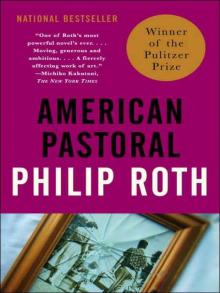 American Pastoral
American Pastoral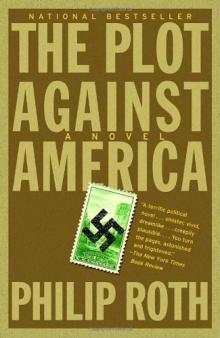 The plot against America
The plot against America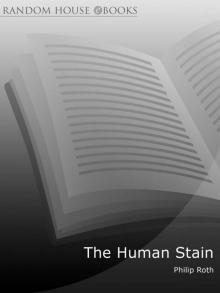 The Human Stain
The Human Stain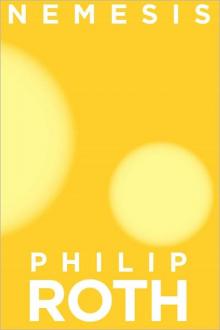 Nemesis n-4
Nemesis n-4 Sabbath’s Theater
Sabbath’s Theater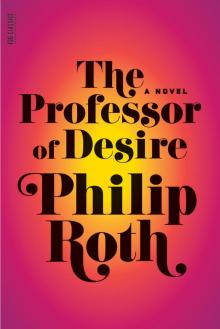 The Professor of Desire
The Professor of Desire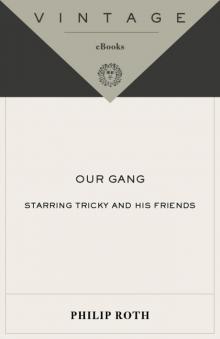 Our Gang
Our Gang The Breast
The Breast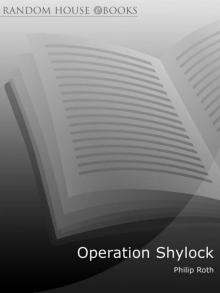 Operation Shylock
Operation Shylock The Dying Animal
The Dying Animal Letting Go
Letting Go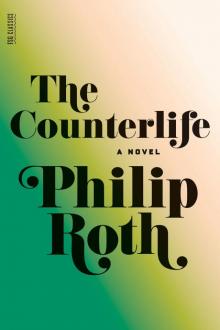 The Counterlife
The Counterlife Everyman
Everyman Nemesis
Nemesis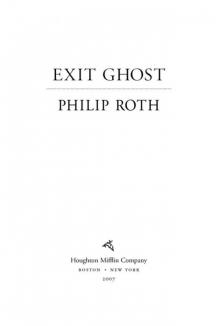 Exit Ghost
Exit Ghost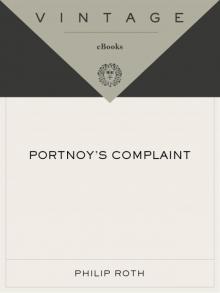 Portnoy's Complaint
Portnoy's Complaint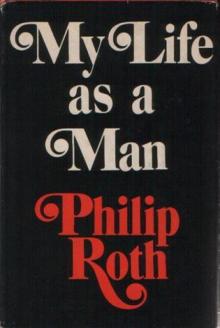 My Life as a Man
My Life as a Man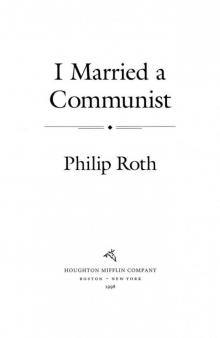 I Married a Communist
I Married a Communist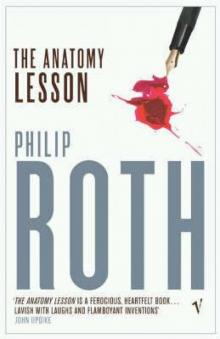 The Anatomy Lesson
The Anatomy Lesson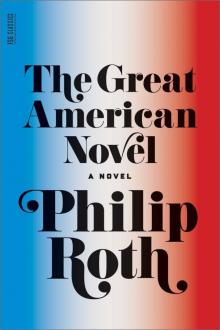 The Great American Novel
The Great American Novel Shop Talk
Shop Talk The Humbling
The Humbling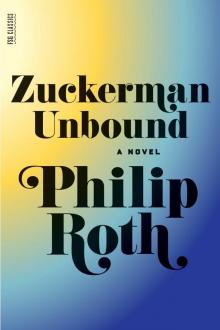 Zuckerman Unbound
Zuckerman Unbound When She Was Good
When She Was Good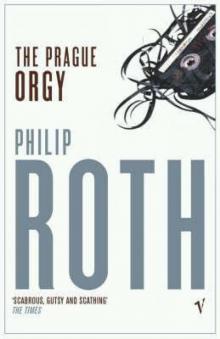 The Prague Orgy
The Prague Orgy American Pastoral (Nathan Zuckerman)
American Pastoral (Nathan Zuckerman) Goodbye, Columbus
Goodbye, Columbus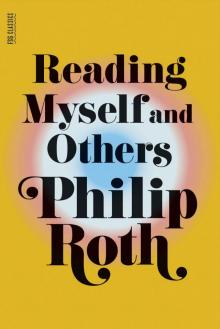 Reading Myself and Others
Reading Myself and Others